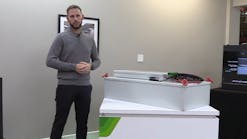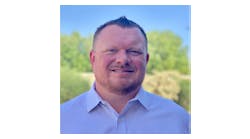With the promise that the Registered Traveler program will be rolled out in as many as 20 American airports this year, allowing pre-screened travelers to move quickly through airport security, New York - based Verified Identity Pass Inc. is targeting potential travel-related clients, and Meeting Professionals International is on the list.
Verified operates the Clear Registered Traveler program, in place at Orlando International Airport, and has been hired to run Registered Traveler programs at the airports in Indianapolis, Cincinnati, and San Jose, Calif. The Transportation Security Administration has said it is on track to roll out the program to 20 airports this year, starting June 20, provided that private-sector companies such as Verified reach agreements with the airports and get the necessary security approvals from TSA.
In the meantime, Verified has been courting potential volume clients for its Clear memberships. Hyatt Hotels & Resorts, for example, is purchasing Clear memberships to offer on a complimentary basis to its Gold Passport, Diamond-tier members. Hyatt also plans to make Clear membership available to other Hyatt guests through promotional offers later this year. (Membership, of course, is not automatic. Travelers must submit to and pass a security screening.)
Verified is also going after large travel-management companies. It reached an agreement with TQ3Navigant of Englewood, Colo., which plans to offer its customers corporate discounts on membership; BCD Travel Partners, a Dutch-owned travel management company with U.S. headquarters in Atlanta; and Travel and Transport Inc. of Omaha, Neb.
"We're launching a new industry," says Fred Fischer, Verified's vice president of sales. "And we've been signing up travel management companies, credit card companies, hotel chains. ... As we add more airports, we'll start looking at other organizations. MPI is definitely on our radar screen."
According to Fischer, corporations are already using Verified as a tool/perk for meetings held in Orlando, the only city with a functioning Registered Traveler program. "We had a law firm in New York bring us in and have us enroll, on site, over 800 people for a meeting in Orlando," Fischer says, adding that the benefit allowed the law firm personnel to zip through security in minutes on the way out of Orlando, rather than endure long security lines. (Because of the time required and complexity of the process, Verified will register a company's travelers on site at their offices only if 250 people or more are applying for the Clear membership.)
While the main advantage of any Registered Traveler program is to make the security-line process more efficient and less intrusive, TSA has announced that Registered Traveler participants will have to go through most of the same security procedures that regular travelers go through. Verified officials, however, say its partnership with General Electric, which will provide technology such as ShoeScanner and Itemiser FX (an explosives and narcotics detector), will help to make the process more efficient and convenient.
Steven Brill, founder and CEO of Verified, believes the Registered Traveler program in Orlando - where Verified has signed up 23,000 business travelers - demonstrates there is a national market for the product. "Our program is working exactly how the original program was intended," Brill says. "It's turning what can be a most frustrating experience [waiting in security lines], into one that's more efficient."
According to Brill, program participants in Orlando fly, on average, three times a month and represent about 12 percent of airport traffic. "Once the program is fully blown out over the next two years, we think we will be able to accommodate 20 [percent] to 50 percent [of the traffic at a participating airport]."
While recent press coverage indicates that some airports, such as Las Vegas' McCarran International, are hesitant to implement Registered Traveler because they do not believe it will enhance security or greatly reduce waiting times, Brill downplayed the reports.
"Some airports have a wait-and-see attitude, some have other issues to worry about at the moment, and some are pushing ahead," Brill maintains. "In some cases, we haven't done enough to communicate."
Copyright 2005 LexisNexis, a division of Reed Elsevier Inc. All rights reserved.
Terms and Conditions | Privacy Policy
News stories provided by third parties are not edited by "Site Publication" staff. For suggestions and comments, please click the Contact link at the bottom of this page.





